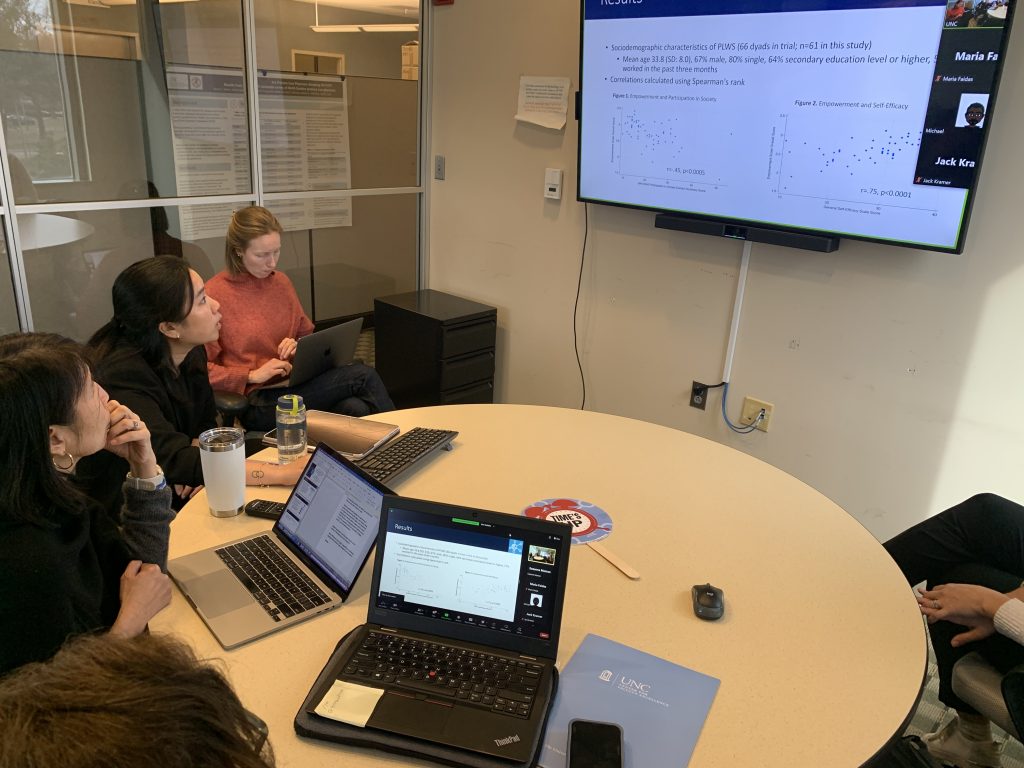It was a busy month for the School of Social Work team. The February roundup includes eight publications.

Associate Professor Sarah E. “Betsy” Bledsoe co-authored the chapter “Interpersonal Psychotherapy Training in Graduate and Residency Programs in the United States” with Luis E. Flores, Jr., Kelsey A. Bonfils and Danielle M. Novick for Interpersonal Psychotherapy: A Global Reach.
Hayden Dawes ’24 (Ph.D.), Associate Professor Will Hall, Assistant Professor Ankur Srivastava, Denise Yookong Williams ’25 (Ph.D.), Tiffany Eden (Johns Hopkins University) and Derrick Matthews (UNC Gillings School of Global Public Health) co-authored “Which types of social support matter for Black sexual minority men coping with internalized homophobia? Findings from a mediation analysis” for Frontiers in Psychology. The authors conducted a study examining the relationships between depression, types of social support and internalized homophobia for Black sexual minority men, finding that “family support is an important factor for clinical intervention efforts targeting depression, and that gay community support systems should assess how their environments can better support Black sexual minority men. Overall, findings demonstrate the necessity of future examination of how social support functions differently within Black sexual minority communities.”
Assistant Professor Orrin Ware, Andrew Huhn (Johns Hopkins University), Jennifer Ellis (Johns Hopkins University), Elizabeth Bird (Johns Hopkins University), Chung Jung Mun (Arizona State University) and Kelly Dunn (Johns Hopkins University) co-authored “Intersectional Risk and the Significant Gap in Care for Persons with Co-occurring Chronic Pain and Opioid Withdrawal” for Journal of Addiction Medicine. The authors “examined characteristics of facilities with opioid withdrawal treatment, including gender-based services, as a function of whether they reported having a tailored pain management program,” with the knowledge that individuals with chronic pain and women enter treatment for opioid use disorder with a greater severity of withdrawal than individuals without chronic pain and men. The authors’ results led them to conclude that more research should be done to examine support patients receive and how to provide access to pain management for individuals in the midst of opioid withdrawal treatment.
Assistant Professor Orrin Ware, Hannah Neukrug (Richmond Behavioral Health) and Assistant Professor Rachel Goode co-authored “Mental health facilities with eating disorder treatment programs and substance use disorder treatment in the United States” for Eating Disorders. With the knowledge that substance use disorders and eating disorders tend to co-occur, the authors examined 1,387 eating disorder treatment facilities in the United States and categorized them depending on whether they provided treatment for substance use disorders. The authors found that most facilities they examined provided both treatment services, but concluded that more needed to be done to improve the facilities’ capacity for providing treatment for both substance use disorders and eating disorders.
Assistant Professor Orrin Ware, Monique Cano (University of Texas Rio Grande Valley), M. Dalal Safa (UNC Department of Psychology and Neuroscience), Noe Garza (University of Texas Rio Grande Valley), Suky Martinez (Columbia University) and Ihsan Salloum (University of Texas Rio Grande Valley) co-authored “Availability of substance use disorder treatment in Spanish: Associations with state-level proportions of Spanish speakers and treatment facility characteristics in the United States” for American Journal on Addictions. The authors conducted a study on the factors associated with substance use treatment facilities having counselors that provided treatment in Spanish, finding that roughly 23.3% of facilities they sampled had counselors able to provide treatment in Spanish. The authors found that those living in a state with a higher percentage of Spanish-speaking individuals, facilities that engaged in community outreach and facilities that accepted Medicaid were more likely to have counselors that provided treatment in Spanish. The authors concluded that it’s important for substance use disorder facilities to provide “linguistically appropriate and culturally responsive services.”
Associate Professor Lisa de Saxe Zerden, Research Assistant Professor Brianna Lombardi, Donald Pathman (UNC Cecil G. Sheps Center), Mandi Gingras (Rural Recruitment and Retention Network), Jessica Seel (South Carolina Office of Rural Health) and Jackie Fannell (Rural Recruitment and Retention Network) co-authored “Preparing behavioral health clinicians for success and retention in rural safety net practices” for The Journal of Rural Health. The authors examined rural safety net practices in 21 states to correlate how the amount of exposure to care in rural underserved communities led to confidence for health clinicians in their work settings, retention and job and community success. The authors concluded that it was crucial for health clinicians to receive formal training for working with underserved populations and found that more training led to a better fit within the communities and a higher retention rate.
Digital Pedagogy Coach Stefanie Panke authored “Open Educational Resources and Artificial Intelligence for Future Open Education” for Mousaion: South African Journal of Information Studies. The article looked at “the intersection of open educational resources (OER) and artificial intelligence (AI), with an emphasis on open pedagogy applications. The article comprises a document analysis to summarise expert perspectives on generative AI and two open pedagogy course concepts that explore the relationship between OER and AI through a practical lens of contexts, infrastructures, and sample work products. The expert interviews were published in the open-access magazine AACE Review and were conducted by the author to capture the dynamic field of generative AI. The two course concepts offer first-hand experiences of designing and implementing student-centred, non-disposable assignments by embedding AI tools in open-access book projects.”
Associate Professor Lisa de Saxe Zerden, Assistant Professor Orrin Ware, Research Assistant Professor Brianna Lombardi and Brooke Lombardi (Cecil G. Sheps Center for Health Services Research) co-authored “Harm reduction workforce, behavioral health, and service delivery in the USA: a cross-sectional study” for Harm Reduction Journal. The authors conducted a mixed-methods study examining four aspects of the harm reduction workforce, including who makes up the harm reduction workforce, who provides behavioral health services for the organizations, whether or not referral services are offered, and if referrals differed depending on the workforce. The authors found the harm reduction workforce is “occupationally diverse,” and stated the importance of understanding the services offered and the workforce offering those services as one attempts to seek insights into staffing and delivery needs to help individuals who use substances.
Presentations & Trainings
MSW student Madeline Van Husen presented at the second annual Global Health Scholars Symposium on Friday, Feb. 16, an event presented by the UNC Institute for Global Health and Infectious Diseases (IGHID) and the UNC Gillings School of Global Public Health (GSGPH). Van Husen’s presentation was titled “Empowerment among treatment-engaged individuals living with schizophrenia in Tanzania.”

Associate Professor Lisa de Saxe Zerden and Research Assistant Professor Brianna Lombardi were invited to present “behavioral health workforce insights” to the National Governors’ Association Workforce Policy Academy on Feb. 7, 2024.
Administrative Research Manager Penny Hawkins is presenting “Budget Building Blocks for Research Administrators” at the National Council of University Research Administrators’ (NCURA) spring meeting in Orlando, Fla., from May 4-8.
Research Associate Professor Tonya Van Deinse, Associate Professor Cynthia Fraga Rizo, Research Assistant Allison Waters, Research Assistant Emily Chavez and Krycya Flores Rojas ’22 (MSW) presented “Lessons from a Community-Engaged Needs Assessment of Crime Victim Services” at the 2024 Pathways to Achieving Civic Engagement Conference on Wednesday, Feb. 14, at Guilford College.
Research Associate Professor Tonya Van Deinse, Nicholas Powell (Georgia Department of Community Supervision), Maria Stephenson (Georgia Department of Community Supervision) and Phil Sellers (Georgia Department of Community Supervision) presented “Making Strategic Planning a Dynamic and Evidence-Informed Process to Improve Community Supervision of Special Populations” at the American Probation and Parole Association 2024 Winter Training Institute in Seattle, Wash., on Monday, Feb. 26.
Mental Health First Aid Program Coordinator Alicia Freeman and School Behavioral Health Program Lead Nina Muller, both from the Behavioral Health Springboard, led a Youth Mental Health First Aid (YMHFA) training for leaders in health care and business across the state on Jan. 31. The training was convened by Blue Cross Blue Shield as a step to address the widely recognized national youth mental and behavioral health crisis, and it finished with a call to action. Youth Mental Health First Aid is an evidence-based curriculum utilized internationally to train adults to identify signs and symptoms of mental health challenges in adolescents and support young people in getting professional help and engaging in self-support strategies. The training was hosted by Blue Cross Blue Shield North Carolina, and was attended by leaders from Blue Cross Blue Shield North Carolina, the North Carolina Department of Health and Human Services, the North Carolina Chamber, the North Carolina Healthcare Association, the North Carolina Medical Society, UNC Health, and UNC Psychiatry. NCDHHS Secretary Kody Kinsley was also in attendance.
Behavioral Health Springboard is hosting a two-part workshop in Greensboro, N.C., on Friday, March 15, from 8 a.m. to 3:30 p.m. at the Koury Convention Center. The two-part workshop will incorporate two topics designed for professionals working with dually diagnosed youth and their families who are navigating the complex intersection of mental health challenges and intellectual/developmental disabilities. Registration includes access to the two workshop trainings, up to six credit hours, meals during the training and one virtual masterclass. You can read more about the event here.
The increasing complexities of treating substance use disorders generates a high demand for qualified clinicians and clinical supervisors. Join the Behavioral Health Springboard for its clinical supervision trainings and/or retreat to explore a wide variety of topics central to successful supervision. The Clinical Supervision Series is divided into two parts; five online sessions and a 2.5-day retreat. Expect an informative, useful, and unusually fresh experience while you gain the knowledge, skills, and continuing education hours necessary to propel your career forward. You can read more about the trainings here.

